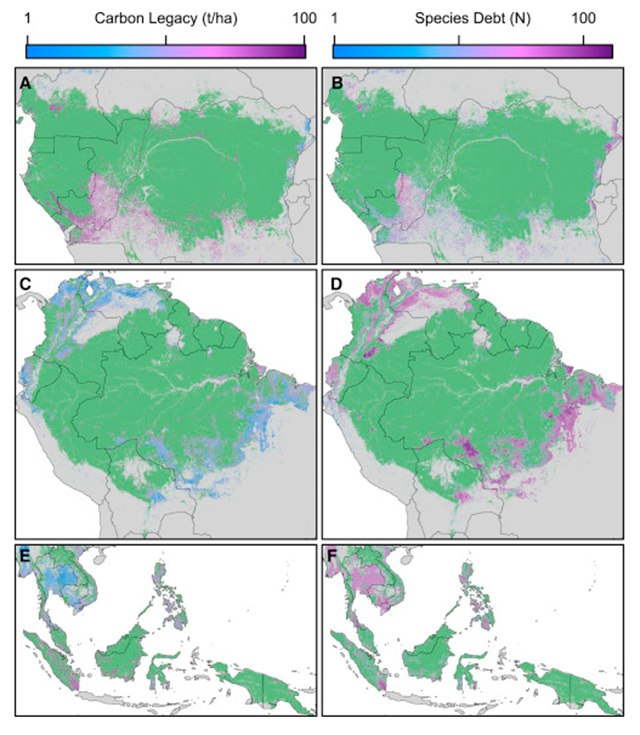Zombie carbon emissions haunt the planet – ‘We’re losing the ability to really solve the climate crisis’
By Amrith Ramkumar
28 July 2016 (Bloomberg) – Deforestation in the Amazon region dropped by 30 percent from 2005 to 2010, sparing trees that soak up carbon dioxide. A big win in the fight against climate change, right? Maybe not big enough to save the planet, or the species on it. After trees are cut down, they gradually decay, releasing carbon, degrading the habitat, and threatening species long after the cutting stops. These lagging emissions have an important impact on the battle against global warming, a study released today in the journal Current Biology finds. Even with the 30 percent reduction in Amazon deforestation, there was only a 10 percent decrease in carbon emissions, the researchers found. And even if tropical deforestation had ended altogether in 2010, there would still be 8.6 petagrams (10 to the 12th kilograms) of emissions released into the atmosphere as trees decomposed, the equivalent of five to 10 years of global deforestation. That’s roughly the annual amount of total global emissions, said Abigail Swann, a University of Washington professor who studies climate change and who wasn’t involved in the study. Those lagging emissions are lethal. Researchers found that 144 vertebrate species became extinct due to tropical deforestation from 1950 to 2009, about 20 percent more than a previous estimate of extinctions in forest-specific vertebrate groups since 1900. As with trees, species losses occur gradually as habitats change, the researchers found. “No one has ever accounted for this time lag between habitat destruction and the species getting extinct,” said Isabel Rosa, one of the authors of the study and a researcher at the Imperial College of London. “That’s what we aimed for with this study, to understand not only how many species have we lost already as a result of habitat destruction, but also how many more have we committed to extinction due to those fast changes in forest cover.” The effects could be even greater as the spaces where trees die are converted into farmland in many areas, particularly the Amazon, one of three main tropical rain forest areas, along with the Congo Basin and Southeast Asia. As trees, which keep temperatures cooler, die, tropical areas will get even warmer and come to resemble a different climate, said Jeff Horowitz, the founder of the nonprofit Avoided Deforestation Partners. […] “We’re losing the ability to really solve the climate crisis,” Horowitz said. [more]
Zombie Carbon Emissions Haunt the Planet 
ABSTRACT: Tropical deforestation has caused a significant share of carbon emissions and species losses, but historical patterns have rarely been explicitly considered when estimating these impacts [1]. A deforestation event today leads to a time-delayed future release of carbon, from the eventual decay either of forest products or of slash left at the site [2]. Similarly, deforestation often does not result in the immediate loss of species, and communities may exhibit a process of “relaxation” to their new equilibrium over time [3]. We used a spatially explicit land cover change model [4] to reconstruct the annual rates and spatial patterns of tropical deforestation that occurred between 1950 and 2009 in the Amazon, in the Congo Basin, and across Southeast Asia. Using these patterns, we estimated the resulting gross vegetation carbon emissions [2, 5] and species losses over time [6]. Importantly, we accounted for the time lags inherent in both the release of carbon and the extinction of species. We show that even if deforestation had completely halted in 2010, time lags ensured there would still be a carbon emissions debt of at least 8.6 petagrams, equivalent to 5–10 years of global deforestation, and an extinction debt of more than 140 bird, mammal, and amphibian forest-specific species, which if paid, would increase the number of 20th-century extinctions in these groups by 120%. Given the magnitude of these debts, commitments to reduce emissions and biodiversity loss are unlikely to be realized without specific actions that directly address this damaging environmental legacy.

It must be remembered that there is no real reason to expect anything in particular from mankind; good and evil are local expedients—or their lack—and not in any sense cosmic truths or laws. We call a thing “good” because it promotes certain petty human conditions that we happen to like—whereas it is just as sensible to assume that all humanity is a noxious pest which should be eradicated like rats or gnats for the good of the planet or of the universe. There are no absolute values in the whole blind tragedy of mechanistic Nature—nothing is either good or bad except as judged from an absurdly limited point of view.